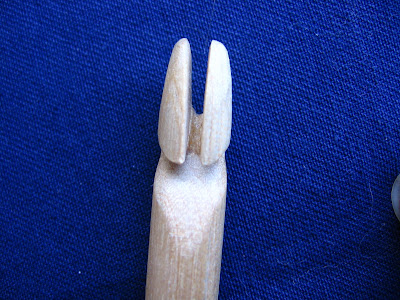 I love spinning with a T-Notched spindle shaft. I learned about this back when I first learned how to spin. I had been spinning with my K'Nex support spindles, and wanted to learn how to spin on a drop spindle. My public library had a copy of this most excellent book, Hands on Spinning
I love spinning with a T-Notched spindle shaft. I learned about this back when I first learned how to spin. I had been spinning with my K'Nex support spindles, and wanted to learn how to spin on a drop spindle. My public library had a copy of this most excellent book, Hands on SpinningI made oodles of these to go with oodles of CD Spindles. I know that there's a huge snob-factor involved in hand spinning, but let me just say it out loud - I love my CD spindles! They taught me how to spin, and I'll always have a soft spot for these perfectly balanced spindles!
Anyway, I'll let these photos tell the tale. Making a T-Notch is an easy task. I used my nifty Japanese Saw - an extraordinary cutting device. How I love my Japanese Saw
- an extraordinary cutting device. How I love my Japanese Saw ! It cuts so smoothly that you don't really need to sand afterwards. It's so balanced, and since it cuts on the pull, it's easy for a woman to use. Amazing. Oops, I forgot, this post is about T-Notches, heh heh heh.
! It cuts so smoothly that you don't really need to sand afterwards. It's so balanced, and since it cuts on the pull, it's easy for a woman to use. Amazing. Oops, I forgot, this post is about T-Notches, heh heh heh.

 I sawed out the notches by making two parallel cuts with my nifty Japanese Saw, then popping out the bit left between the cuts. The Japanese Saw blade is paper thin - if you are using an "American" or "English" saw, then the kerf of the blade ought to make enough of a slot.
I sawed out the notches by making two parallel cuts with my nifty Japanese Saw, then popping out the bit left between the cuts. The Japanese Saw blade is paper thin - if you are using an "American" or "English" saw, then the kerf of the blade ought to make enough of a slot.Then, I did some shaping with my Chisels .
.
 The trick is to get the "slot" to end a little teeny bit past the midline, as viewed from the side.
The trick is to get the "slot" to end a little teeny bit past the midline, as viewed from the side.

 And, a little teeny bit past the midline as viewed from the top. Having your notch "pass up" the midline means that your yarn will ride right at the middle. If your slots end at the midline, then your yarn will not sit in the middle - Get it?
And, a little teeny bit past the midline as viewed from the top. Having your notch "pass up" the midline means that your yarn will ride right at the middle. If your slots end at the midline, then your yarn will not sit in the middle - Get it?
 This was my very first one - the most crude looking, and oddly enough, the most perfect of them all. The yarn is perfectly centered, and it spins like a dream.
This was my very first one - the most crude looking, and oddly enough, the most perfect of them all. The yarn is perfectly centered, and it spins like a dream.



 I ground the tip into a rather conical shape, for aesthetics - it makes no difference in the performance.
I ground the tip into a rather conical shape, for aesthetics - it makes no difference in the performance.

 Here is how you "thread" the T-Notch. Your yarn can go up one side for spinning, and the other side for plying.
Here is how you "thread" the T-Notch. Your yarn can go up one side for spinning, and the other side for plying.

 These last two are made from Oak - a very suitable wood for notches, as it is so strong. The first one is, I think, birch, which is so easy to carve, but so easy to break, too. Frustrating. But, I like the lighter weight of the birch.
These last two are made from Oak - a very suitable wood for notches, as it is so strong. The first one is, I think, birch, which is so easy to carve, but so easy to break, too. Frustrating. But, I like the lighter weight of the birch.
 The trick is to get the "slot" to end a little teeny bit past the midline, as viewed from the side.
The trick is to get the "slot" to end a little teeny bit past the midline, as viewed from the side.
 And, a little teeny bit past the midline as viewed from the top. Having your notch "pass up" the midline means that your yarn will ride right at the middle. If your slots end at the midline, then your yarn will not sit in the middle - Get it?
And, a little teeny bit past the midline as viewed from the top. Having your notch "pass up" the midline means that your yarn will ride right at the middle. If your slots end at the midline, then your yarn will not sit in the middle - Get it? This was my very first one - the most crude looking, and oddly enough, the most perfect of them all. The yarn is perfectly centered, and it spins like a dream.
This was my very first one - the most crude looking, and oddly enough, the most perfect of them all. The yarn is perfectly centered, and it spins like a dream.


 I ground the tip into a rather conical shape, for aesthetics - it makes no difference in the performance.
I ground the tip into a rather conical shape, for aesthetics - it makes no difference in the performance.
 Here is how you "thread" the T-Notch. Your yarn can go up one side for spinning, and the other side for plying.
Here is how you "thread" the T-Notch. Your yarn can go up one side for spinning, and the other side for plying.
 These last two are made from Oak - a very suitable wood for notches, as it is so strong. The first one is, I think, birch, which is so easy to carve, but so easy to break, too. Frustrating. But, I like the lighter weight of the birch.
These last two are made from Oak - a very suitable wood for notches, as it is so strong. The first one is, I think, birch, which is so easy to carve, but so easy to break, too. Frustrating. But, I like the lighter weight of the birch.My only complaint is that you have to use a fairly thick shaft in order to have enough wood to carve. I much prefer a thinner shaft. It could be machined into a thinner metal shaft, but I'm a woodworker, not a machinist, lol.
I still have a soft spot for these notches - this is how I learned to spin - and I just like the wooden hook. As you wind the yarn up the shaft, it automatically "falls" into the notch - it's easy to use.
(You don't have to use CD's as whorls for this style of shaft, of course.)
Try it - see how you like this style of shaft.

3 comments:
Really very interesting. Thanks for posting.
You're welcome! I hope that this is useful to you.
I'm learning how to make these T-notches for Akha spindles and this post was just perfect. Thank you so much. The wooden hooks are really nice...they don't get all bent up if dropped.
Post a Comment